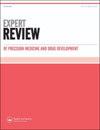精准医疗时代癌症腔内转移性乳腺癌的内分泌治疗:寻找新靶点
IF 1.2
Q4 PHARMACOLOGY & PHARMACY
Expert Review of Precision Medicine and Drug Development
Pub Date : 2020-01-02
DOI:10.1080/23808993.2020.1720508
引用次数: 4
摘要
摘要简介:激素受体阳性(HR+)癌症(BC)是最常见的BC亚型,雌激素受体(ER)信号传导阻断仍然是治疗的基石。然而,几乎所有HR+BC患者都对内分泌治疗产生耐药性,这是BC患者未满足的关键治疗需求。基因组医学的最新进展使人们能够更详细地识别和更好地表征内分泌抵抗的机制,并开发出可能恢复内分泌敏感性的靶向药物,从而改善疾病控制和潜在的生存率。涵盖的领域:这里概述了HR阳性转移性BC(MBC)治疗的早期开发新药。PI3K/AKT/mTOR、FGFR和IGFRs是解决的主要途径,也报道了HER2在三阳性疾病中阻断的证据。提出了新的抗雌激素受体1(ESR1)突变MBC的激素制剂。最后简要介绍了不靶向细胞内信号中枢的生物制剂,如组蛋白脱乙酰酶抑制剂和免疫疗法药物。专家意见:大多数正在开发的新药都报告了有希望的结果。尽管如此,“精准医学方法”仍然必须证明对这种疾病有好处。鉴定可靠的预测性生物标志物应该是未来研究的一个关键目标。本文章由计算机程序翻译,如有差异,请以英文原文为准。
Moving beyond endocrine therapy for luminal metastatic breast cancer in the precision medicine era: looking for new targets
ABSTRACT Introduction: Hormone receptor-positive (HR+) breast cancer (BC) is the most frequent BC subtype, for which estrogen receptor (ER)-signaling blockade still represents the cornerstone of treatments. Nevertheless, almost all HR+ BC patients develop resistance to endocrine therapy, a critical therapeutic unmet need for BC patients. Recent advances in genomic medicine allowed for a more detailed identification and better characterization of the mechanisms underlining endocrine resistance and led to the development of targeted agents potentially able to restore endocrine sensitivity, thus improving disease control and potentially survival. Areas covered: New drugs in the early phase of development for HR-positive metastatic BC (MBC) treatment are here outlined. PI3K/AKT/mTOR, FGFR, and IGFRs are the main pathways addressed, and evidences about HER2 blockade in triple-positive diseases are also reported. New hormonal agents active against estrogen receptor 1 (ESR1)-mutant MBC are presented. A brief mention of biological agents not targeting intracellular signaling hubs, such as histone-deacetylase inhibitors and immunotherapy drugs, is finally provided. Expert opinion: promising results have been reported for the majority of new drugs under development. Despite this, a ‘precision medicine approach’ still has to demonstrate a benefit in this disease. Identification of reliable predictive biomarkers should be a key objective of future researches.
求助全文
通过发布文献求助,成功后即可免费获取论文全文。
去求助
来源期刊

Expert Review of Precision Medicine and Drug Development
PHARMACOLOGY & PHARMACY-
CiteScore
2.30
自引率
0.00%
发文量
9
期刊介绍:
Expert Review of Precision Medicine and Drug Development publishes primarily review articles covering the development and clinical application of medicine to be used in a personalized therapy setting; in addition, the journal also publishes original research and commentary-style articles. In an era where medicine is recognizing that a one-size-fits-all approach is not always appropriate, it has become necessary to identify patients responsive to treatments and treat patient populations using a tailored approach. Areas covered include: Development and application of drugs targeted to specific genotypes and populations, as well as advanced diagnostic technologies and significant biomarkers that aid in this. Clinical trials and case studies within personalized therapy and drug development. Screening, prediction and prevention of disease, prediction of adverse events, treatment monitoring, effects of metabolomics and microbiomics on treatment. Secondary population research, genome-wide association studies, disease–gene association studies, personal genome technologies. Ethical and cost–benefit issues, the impact to healthcare and business infrastructure, and regulatory issues.
 求助内容:
求助内容: 应助结果提醒方式:
应助结果提醒方式:


